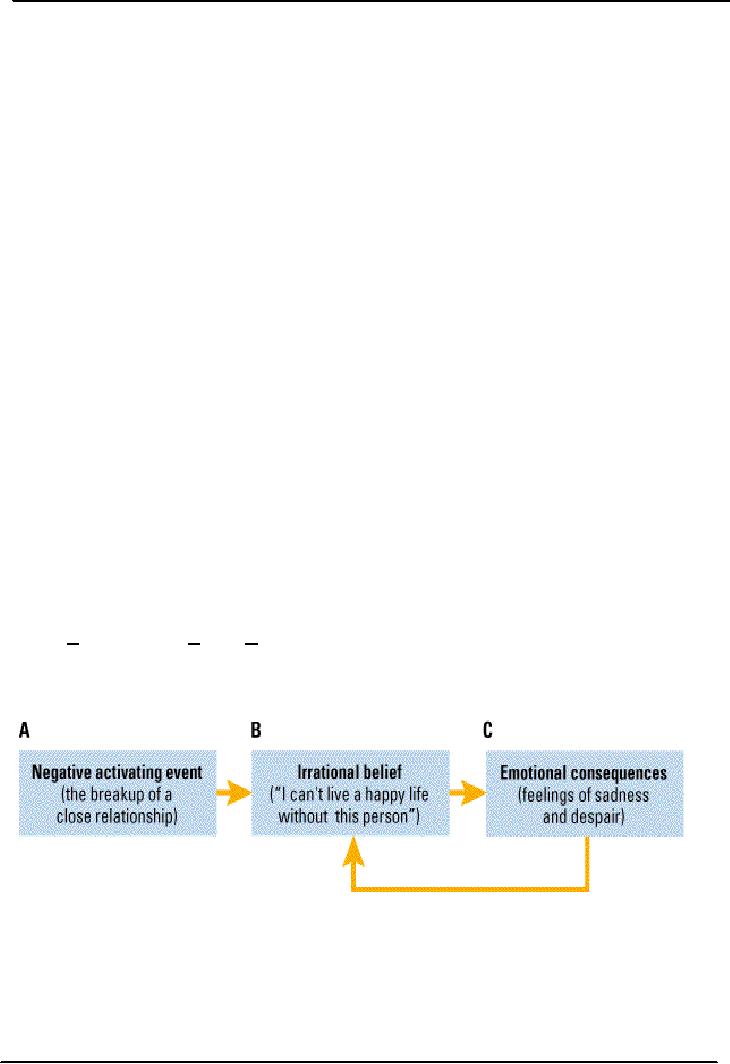 |

Theory
and Practice of Counseling -
PSY632
VU
LESSON
33
COGNITIVE
APPROACHES TO COUNSELING
In the previous
lecture we discussed that
Irrational linking may include the
invention of upsetting and
disturbing
thoughts. Ellis (1962) lists 11
common irrational beliefs
that can be quite disturbing.
These are
given
below:
∑
"I
must be perfect or no one will
love me!"
∑
"I
must be thoroughly competent,
adequate, and successful in
all possible respects if I am to
be
worthwhile."
∑
"It
is horrible when things do not turn
out the way I want them
to."
∑
"Some
people are bad, wicked or villainous,
and they should be punished"
∑
"Unhappiness
is a function of events and
outside the control of the
individual"
∑
"If
something may be dangerous or
harmful, an individual should constantly
concerned and think
about
it"
∑
"It
is easier to run away from
difficulties and self-responsibility than
it is to face them"
∑
"Individuals
need to be dependent on others
and have someone stronger
than themselves to
lean
on"
∑
"Past
events in an individual's life
determine present behavior
and can not be
changed"
∑
"An
individual should be very concerned and
upset by others' problems"
∑
"There
is always a correct and
precise answer to every
problem and it is catastrophic if
not found"
Counseling
Process
Although
Ellis (1973) does not
deal with the developmental stages of
individuals, he thinks that
children are
more
vulnerable to outside influences and
irrational thinking than
adults are. By nature, he
believes human
beings
are gullible and highly
suggestible and are easily
disturbed. Overall, people have within
themselves
the
means to control their thoughts,
feelings, and action; but they
must realize what they are
telling
themselves
(self-talk) to gain commands of their
lives. This is a matter of personal,
conscious awareness.
Role
of the Counselor
In
the RET approach, counselor
are active and direct. They
are instructors who teach
and correct the
client's
cognition.
Ellis
(1980) identifies several
characteristics desirable for
RET counselors.
∑
Bright
∑
Knowledgeable
∑
Empathetic
∑
Persistent
∑
Scientific
∑
Interested
in helping others
∑
Users
themselves of RET
139

Theory
and Practice of Counseling -
PSY632
VU
Counselors'
main assessment
instruments:
∑
Evaluation
of a client's thinking
∑
Some
formal tests may be employed
to measure rational and
irrational thinking, but the
evaluation
process
is primarily accomplished in counselor-client
sessions.
∑
RET
practitioners do not reply heavily on the
diagnostic categories in the
DSM-IV.
Goals
The
primary goals of RET focus on
helping people realize that they
can live more rational
and productive
lives.
"Roughly speaking, rational-emotive
therapy constitutes an attempt to correct
mistakes in a client's
reasoning
as a way of eliminating undesirable
emotions"
RET
is heavily influenced by stoic philosophy,
and Ellis is found of
quoting a first-country stoic,
Epictetus,
who
wrote, "Men feel disturbed not by things,
but by the views which they
take of them". Often
individuals
disturb
themselves by changing wishes
and desires into demands.
When a person uses words
such as Must,
Ought,
Should, he or she makes demands of
wishes and thinks
irrationally. RET helps
clients stop making
such
demands and becoming upset
through "catastrophizing".
Another
goal of RET is to help people
change self-defeating habits of thoughts
or behavior. One way this is
accomplished
is through teaching clients ABCs of
RET.
Thoughts
about experiences may be
characterized in four ways: positive,
negative, neutral, or mixed. A
positive
thought leads to positive
feelings, while people may
have negative feelings about the
same event in
response
to negative thought. The mixed thoughts
lead to ambivalent feelings.
A-B-C's
of Emotional Distress
Disorders
often occur with
self-defeating beliefs
∑
Activating
Event - Beliefs
- Consequences
Techniques
∑
RET
encompasses a number of diverse
techniques. Two primary ones
are:
Teaching
o
140

Theory
and Practice of Counseling -
PSY632
VU
Disputing.
o
∑
Before
changes can be made, clients
have to learn the basic
ideas of RET and understand
how
thoughts
are linked with emotions and
behaviors.
∑
Teaching: In the
first few session,
counselors teach their
clients the anatomy of an emotion
that
feelings
are a result of thoughts, not
events, and that self-talk
influences emotions.
Cognitive
Disputing
∑
Cognitive
disputation involves the
use of direct questions, logical
reasoning and persuasion.
Direct
questions may challenge the
client to prove that his or
her response is
logical.
∑
Another
form of cognitive disputation
involves the use of syllogisms "a
deductive of reasoning
consisting
of two premises and a
conclusion.
∑
For
example in irrational "can't
stand-it-it is," the process
might go as follows (Cohen,
1987, p.39):
Major
premises: "Nobody can stand
to be lied to."
o
Minor
premise
"I
was lied to."
o
Conclusion:
"I
can't stand it."
o
∑
Imaginal
disputation depends
on the client's ability to imagine
and employs a technique
known
as
rational-emotive imagery.
∑
The
emotional control card (ECC)
is a device that helps
clients reinforce and expand the
practice of
REL.
Four emotionally debilitating
categories (anger, self
criticism, anxiety and depression)
are
listed
on wallet sized ECCs (Ellis, 1986).
Under each category is a
list of inappropriate or
self-
destructiv3e
feelings and a parallel list of
appropriate or non-defeating feelings.
Behavioral
Disputation
∑
Behavioral
disputation involves behaving in a way
that is the opposite of the client's
usual way.
∑
Sometimes
behavioral disputation may take the
form of bibliotherapy in which the client
reads a
self-help
book.
∑
Role
playing
∑
Completion
of home assignment
tasks
Confrontation
and Encouragement
Two
others powerful techniques
are confrontation and
encouragement:
∑
RET
counselors explicitly encourage
clients to abandon thought
processes that are not
working and
try
RET.
∑
Confrontation
need not be done in the manner
Ellis uses: vigorously
confronting and attacking the
client's
beliefs. Instead a counselor may be
empathetic and insistent at the
same times.
Evaluation:
Strengths
∑
The
approach is clear, easily
learned, and effective
∑
The
approach can easily be combined
with behavioral techniques to help
clients more fully
experience
what they are learning
∑
The
approach is relatively short term,
usually lasting
141

Theory
and Practice of Counseling -
PSY632
VU
∑
The
approach has generated a
great deal of literature and
research for clients and
counselors
∑
The
approach has continued to evolve
over the years as techniques
have been refined.
Evaluation:
Limitations
∑
The
approach cannot be used effectively
with individuals who have
mental problems or
limitations,
such
a s schizophrenics and those
with severe thought
disorders.
∑
The
approach may be too closely
associated with its founder,
Albert Ellis. Many
individuals have
difficulty
separating the theory from Ellis's
eccentricities.
∑
The
approach is limited if its practitioners
do not combine its early
cognitive base with
more
behavioral
and emotive techniques.
142
Table of Contents:
- INTRODUCTION:Counseling Journals, Definitions of Counseling
- HISTORICAL BACKGROUND COUNSELING & PSYCHOTHERAPY
- HISTORICAL BACKGROUND 1900-1909:Frank Parson, Psychopathic Hospitals
- HISTORICAL BACKGROUND:Recent Trends in Counseling
- GOALS & ACTIVITIES GOALS OF COUNSELING:Facilitating Behavior Change
- ETHICAL & LEGAL ISSUES IN COUNSELING:Development of Codes
- ETHICAL & LEGAL ISSUES IN COUNSELING:Keeping Relationships Professional
- EFFECTIVE COUNSELOR:Personal Characteristics Model
- EFFECTIVE COUNSELOR:Humanism, People Orientation, Intellectual Curiosity
- EFFECTIVE COUNSELOR:Cultural Bias in Theory and Practice, Stress and Burnout
- COUNSELING SKILLS:Microskills, Body Language & Movement, Paralinguistics
- COUNSELING SKILLS COUNSELORíS NONVERBAL COMMUNICATION:Use of Space
- COUNSELING SKILLS HINTS TO MAINTAIN CONGRUENCE:
- LISTENING & UNDERSTANDING SKILLS:Barriers to an Accepting Attitude
- LISTENING & UNDERSTANDING SKILLS:Suggestive Questions,
- LISTENING & UNDERSTANDING SKILLS:Tips for Paraphrasing, Summarizing Skills
- INFLUENCING SKILLS:Basic Listening Sequence (BLS), Interpretation/ Reframing
- FOCUSING & CHALLENGING SKILLS:Focused and Selective Attention, Family focus
- COUNSELING PROCESS:Link to the Previous Lecture
- COUNSELING PROCESS:The Initial Session, Counselor-initiated, Advice Giving
- COUNSELING PROCESS:Transference & Counter-transference
- THEORY IN THE PRACTICE OF COUNSELING:Timing of Termination
- PSYCHOANALYTIC APPROACHES TO COUNSELING:View of Human Nature
- CLASSICAL PSYCHOANALYTIC APPROACH:Psychic Determination, Anxiety
- NEO-FREUDIANS:Strengths, Weaknesses, NEO-FREUDIANS, Family Constellation
- NEO-FREUDIANS:Task setting, Composition of Personality, The Shadow
- NEO-FREUDIANS:Ten Neurotic Needs, Modes of Experiencing
- CLIENT-CENTERED APPROACH:Background of his approach, Techniques
- GESTALT THERAPY:Fritz Perls, Causes of Human Difficulties
- GESTALT THERAPY:Role of the Counselor, Assessment
- EXISTENTIAL THERAPY:Rollo May, Role of Counselor, Logotherapy
- COGNITIVE APPROACHES TO COUNSELING:Stress-Inoculation Therapy
- COGNITIVE APPROACHES TO COUNSELING:Role of the Counselor
- TRANSACTIONAL ANALYSIS:Eric Berne, The child ego state, Transactional Analysis
- BEHAVIORAL APPROACHES:Respondent Learning, Social Learning Theory
- BEHAVIORAL APPROACHES:Use of reinforcers, Maintenance, Extinction
- REALITY THERAPY:Role of the Counselor, Strengths, Limitations
- GROUPS IN COUNSELING:Major benefits, Traditional & Historical Groups
- GROUPS IN COUNSELING:Humanistic Groups, Gestalt Groups
- MARRIAGE & FAMILY COUNSELING:Systems Theory, Postwar changes
- MARRIAGE & FAMILY COUNSELING:Concepts Related to Circular Causality
- CAREER COUNSELING:Situational Approaches, Decision Theory
- COMMUNITY COUNSELING & CONSULTING:Community Counseling
- DIAGNOSIS & ASSESSMENT:Assessment Techniques, Observation
- FINAL OVERVIEW:Ethical issues, Influencing skills, Counseling Approaches